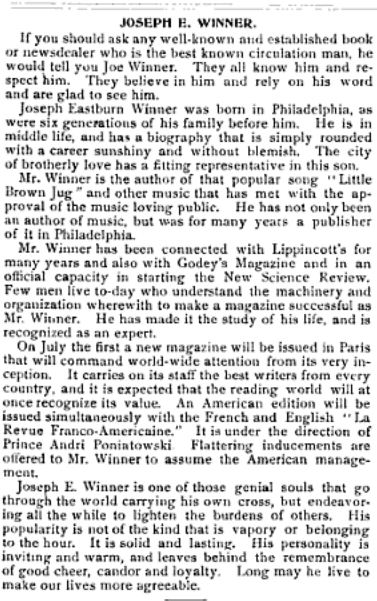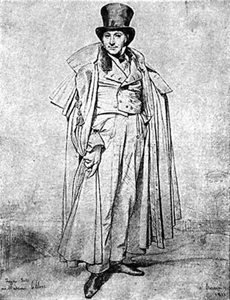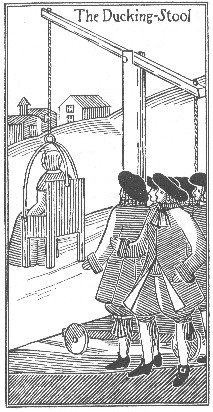Image from The Journal of American History
OIL ON THE BRAIN.
A COMIC BALLAD.BY EASTBURN.
The Yankees that they make clocks
Which “just beat all creation.”
They never made one could keep time
With our great speculation.
Our stocks, like clocks, go with a spring:
wind up, run down again;
But all our strikes are sure to cause
Oil on the brain.CHORUS:
Stocks par, stocks up,
then on the wane,
Everybody’s troubled with
Oil on the brain.There’s various kinds of oil afloat: cod-liver,
Castor, sweet–
Which tend to make a sick man well, and set
him on his feet;
But ours a curious feat performs — We just a
well obtain,
And set the people crazy with
Oil on the brain.CHORUS
There’s neighbor Smith, a poor young man,
Who could not raise a dime,
Had clothes that boasted many rents,
And took his “Nip” on time;
But now he’s clad in dandy style,
Sports diamonds, kids, and cane;
And his success was owing to
Oil on the brain.CHORUS
Miss Simple drives her coach and four,
And dresses in high style;
And Mr. Shoddy courts her strong,
Because her “Dad’s struck ile.”
Her jewels, laces, velvets, silks,
Of which she is so vain,
Were bought by “Dad” the time he had
Oil on the brain.CHORUS
You meet a friend upon the street.
He greets you with a smile,
And tells you, in a hummed way,
He’s “just gone into ile.”
He button-holds you half an hour —
Of course, you can’t complain —
For, you can see the fellow has
Oil on the brain.CHORUS
The lawyers, doctors, hatters, clerks,
Industrious and lazy,
Have put their money all in stocks,
In fact, have gone “oil crazy,”
They’d better stick to briefs and pills,
Hot irons, ink and pen,
Or they will “kick the bucket” from
Oil on the brain.CHORUS
Poor Mrs. Jones was taken ill.
The doctors gave her up.
They lost the confidence they had
In lancet, leech, and cup.
“Afflictions sore long time she bore,
Physicians were in vain;”
And she, at last, expired of
Oil on the brain.CHORUS
There’s “Maple Shade,” “Monitor,”
“Bull Creek,” “Big Tank,” “Dalzell,”
And “Keystone,” “Star,” “Venango,”
“Briggs,”
“Organic” and “Farewell,”
“Petroleum,” “Saint Nicholas,”
“Cornplanter,” “New Creek Vein;”
Sure ’tis no wonder many have
Oil on the brain.CHORUS
Stocks par, stocks up,
then on the wane,
Everybody’s troubled with
Oil on the brain.
Then Venango Spectator (Franklin, Pennsylvania) Mar 1, 1865
Sheet music can be found at Jscholarship
Tune and Lyrics (scroll down) at American Civil War Music
The Little Brown Jug – [excerpts]
….It is generally used to-day as a college drinking song. A peculiar use when it is considered that its author, “Eastburn,” which was the nom de plume signed to most of his music by Joseph Eastburn Winner, was a strictly temperate man and an advocate of temperance, rather than an encourage of the “little brown jug.”
…..Whenever he outlined a song, before he put on the finishing touches, he would call in a little bootblack from the street, and used him as a sort of audience and musical critic combined. He knew most of the boys who in those days plied their trade in and about the old Reading Terminal, of Philadelphia, at Ninth and Green streets. Mr. Winner would seat himself at the piano, first telling the “audience and critic” that he wanted to play for him a new piece he had composed. He would begin and play it through, not once, but a dozen times, watching the effect on the “audience,” and if it moved its feet, or seemed to have any special effect, or if the “shine” would go out whistling it after the recital, Mr. Winner put it down a winner, and he says the test never failed him.
….Mr. Winner does not claim absolute originality in the writing of “The Little Brown Jug,”….. Mr. Winner jotted down the poem, entirely rearranged it into verse and chorus, added several verses, and sat down at the piano and wrote the melody….
…..Mr. Joseph Eastburn Winner is still living in West Philadelphia enjoying the best of health. His life has been a most active one, and he is now enjoying the ease of a man who has accomplished much and is willing to spend his remaining years in the pleasant memories of the past. He is a brother of Septimus Winner, the composer of “The Mocking Bird,” and many other songs. When “Eastburn” was only twelve years old he was able to play the violin so well that he was frequently heard in concert in Philadelphia as a prodigy. At this time he made his home with his older brother Sep., at Franklin and Callowhill streets.
One of the first songs Winner composed and published was “The Ring My Mother Wore.” It became immensely popular. The words had been written by Lewis Dela, who was known in Philadelphia as “The Bard of Tower Hall.” A short time after this came the oil excitement, and Mr. Winner wrote one of his best comic songs, which was called, “Oil on the Brain,” and which was sung in all parts of the country. It was first sung by Mr. Dixie, of Carncross & Dixie’s, and was frequently hear on the stage at the Old Arch Street Theater, then conducted by Mrs. John Drew.
…..He was only in his teens when he wrote “The Ring My Mother Wore,” and for its composition he received then bright silver dollars, which to him in those days seemed a small fortune. For many of his songs later in life he received large sums…..
After conducting the store at Eighth and Green streets for a number of years, he sold it to his brother, Septimus Winner, and went into the publishing business with J.M. Stoddart, at 1018 Chestnut street. They published extensively the Encylopaedia Britannica, and bought out all the Gilbert & Sullivan operas, as well as a great deal of music of various classes….
…..Mr. Winner has been married twice. His children of his first wife are living in Philadelphia, and with his second wife he has one son, a bright boy of seven, who bears the name of Hawthorne Winner, Hawthorne being Mr. Winner’s mother’s name, and out of respect for her Mr. Septimus Winner used the pen name of “Alice Hawthorne” for “The Mocking Bird” and many other songs he composed….
The Washington Herald (Washington, D.C.) Jun 19, 1910
The Bookseller and Newsman, v. 12 (google link)


















